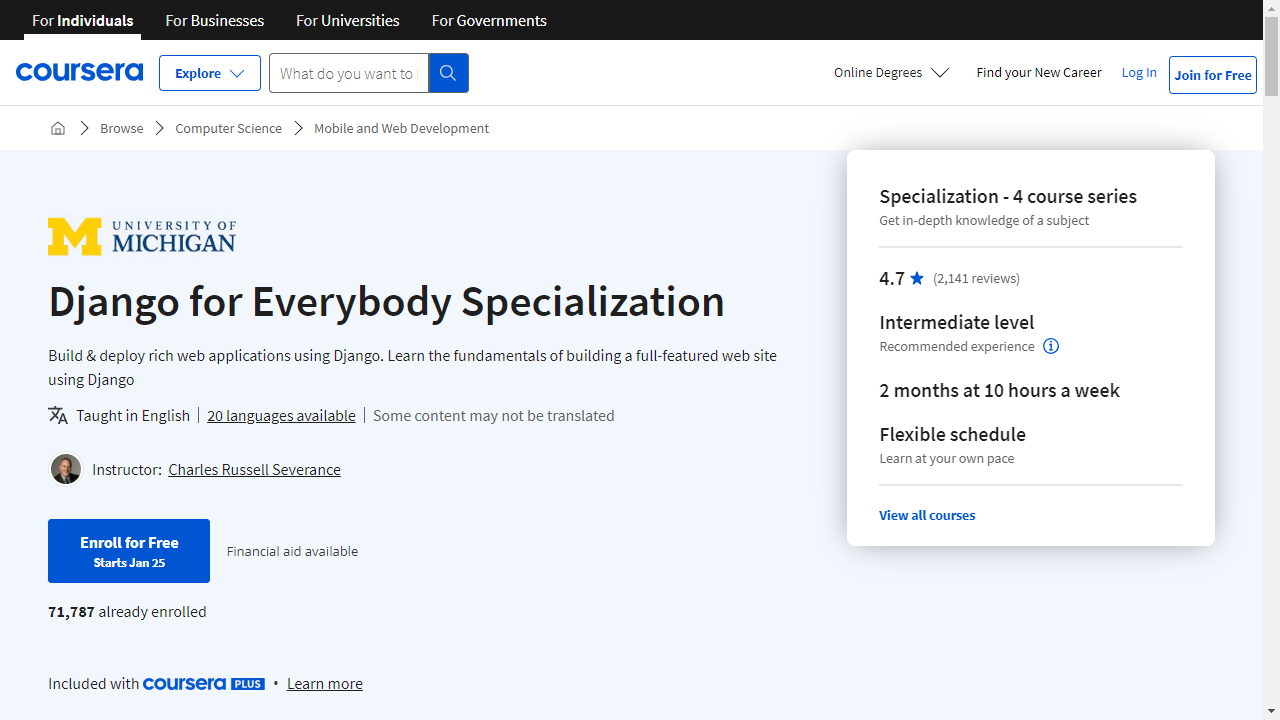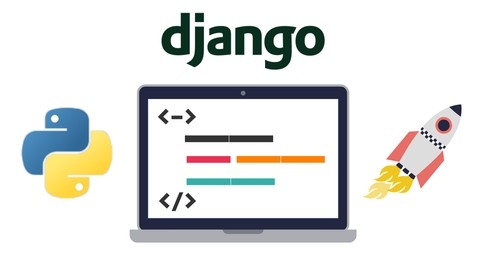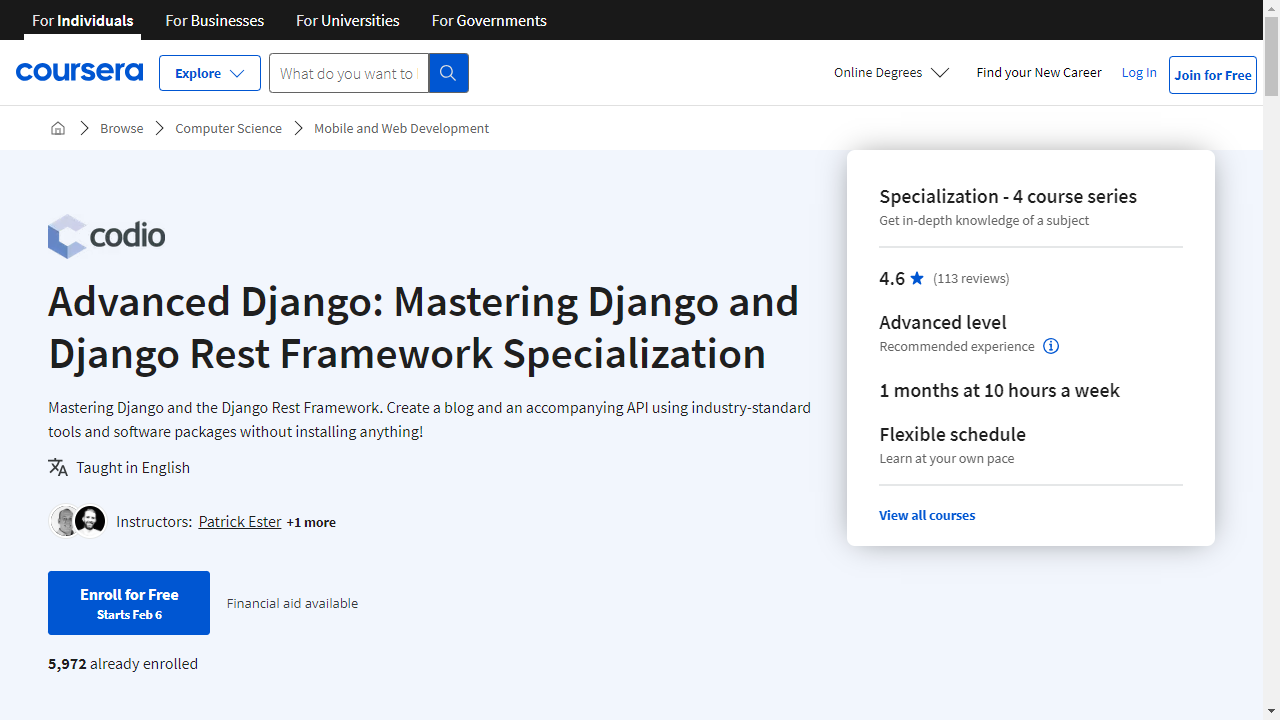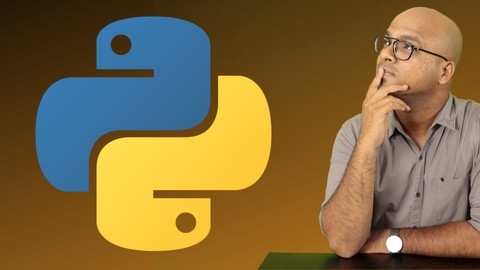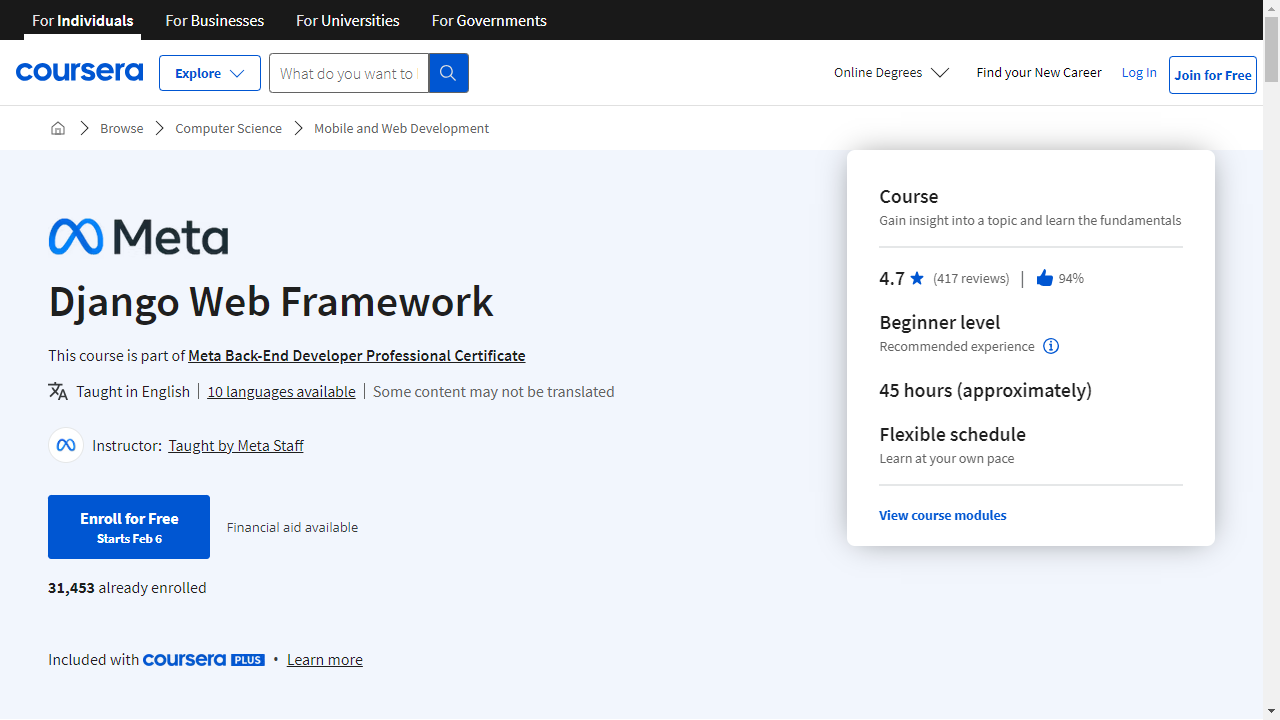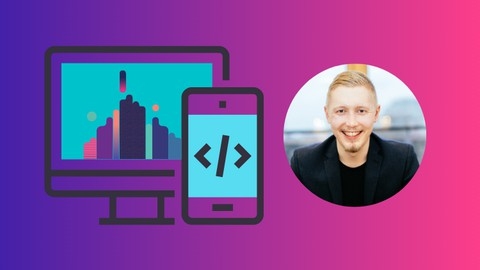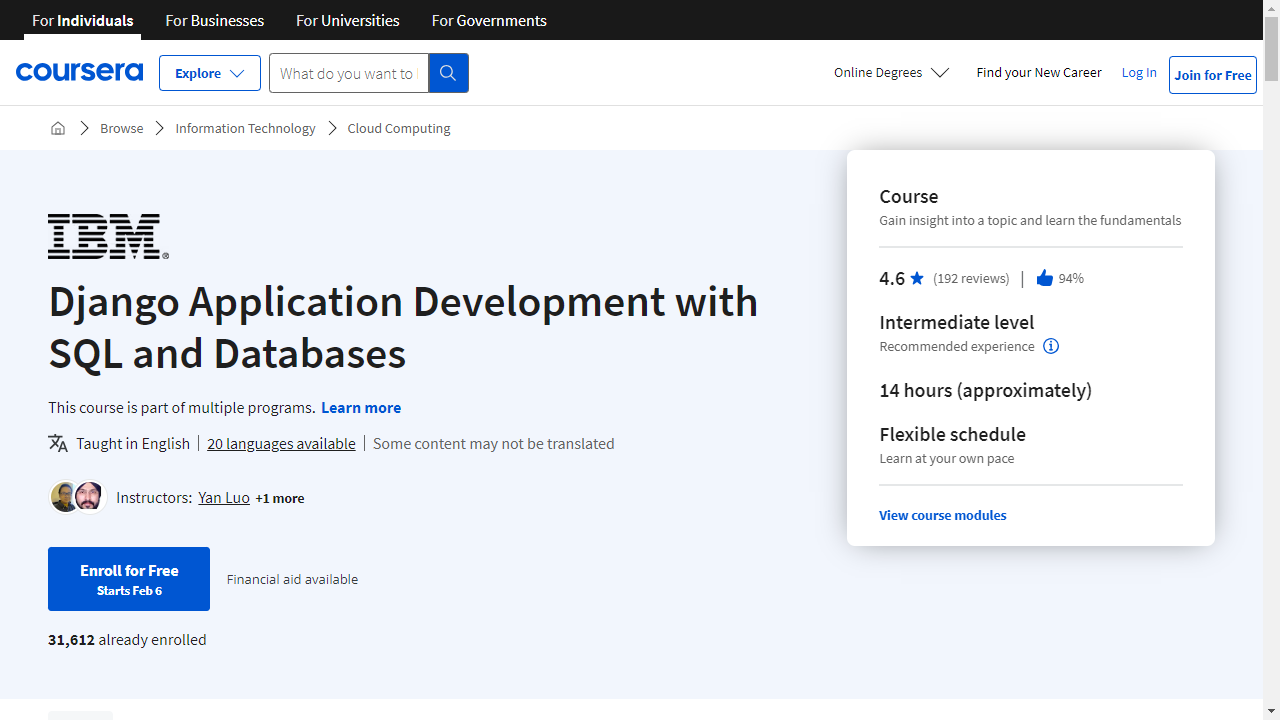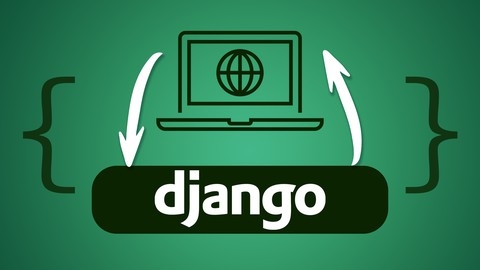Django is a high-level Python web framework that encourages rapid development and clean, pragmatic design.
It’s incredibly popular for building web applications because it handles many common web development tasks, allowing developers to focus on writing their app without needing to reinvent the wheel.
Learning Django can open doors to exciting career opportunities in web development, enabling you to build robust, scalable, and secure web applications.
However, finding the right Django course can be a challenge.
You’re likely looking for a comprehensive learning experience that covers both fundamental concepts and advanced techniques, all while being engaging and easy to follow.
You want a course that not only teaches you the syntax but also empowers you to build real-world projects and understand best practices.
Based on our research, the best course overall for learning Django is the Django for Everybody Specialization offered on Coursera.
This specialization, created by Dr. Charles Severance, provides a comprehensive and beginner-friendly introduction to Django, starting with web development basics and progressing to building complex applications.
Its hands-on approach, clear explanations, and engaging projects make it an ideal choice for learners of all levels.
That being said, the Django for Everybody Specialization isn’t the only excellent Django course out there.
We’ve compiled a list of other top-rated courses that cater to various learning styles, experience levels, and specific interests.
Keep reading to explore more options and find the perfect Django course for your web development journey!
Django for Everybody Specialization
Provider: Coursera
This specialization teaches everything from web development basics to building complex Django applications.
You’ll begin by understanding how web applications work - how a browser interacts with a server using HTTP.
You’ll learn about HTML for building web pages, CSS for styling, and the MVC pattern that Django uses.
You even get to deploy a simple Django application using PythonAnywhere.
Next, you’ll dive deeper into Django and learn how it interacts with databases using models and Object-Relational Mapping (ORM).
You’ll explore SQL for database management and use the Django console to interact with your application.
You’ll learn about different data relationships like one-to-many and many-to-many, and how they work in SQL and Django.
You’ll then explore more advanced Django features, including cookies, sessions, and user authentication - all essential for building secure web applications.
You’ll learn how to create navigation menus and improve the look and feel of your applications.
The best part?
You’ll apply your skills to build a classified ads website, taking you from development to production.
Finally, you’ll learn how to make your applications interactive with JavaScript.
You’ll be introduced to jQuery, a library that simplifies working with the Document Object Model (DOM).
You’ll use JavaScript, jQuery, and JSON to add dynamic features to your classified ads project, bringing it to life.
Python and Django Full Stack Web Developer Bootcamp
Provider: Udemy
This course takes you on a journey from the front end to the back end of web development, teaching you how to build dynamic, interactive websites using popular technologies.
You start with the fundamentals of front-end development, learning how to structure web pages with HTML, style them with CSS, and add interactivity with Javascript.
You will even get hands-on experience with Bootstrap, a framework that makes it easy to create responsive, professional-looking websites.
You then delve into the back end, learning the basics of Python, a powerful and versatile programming language.
You master Python’s core concepts, preparing you to tackle Django, a popular framework for building web applications.
Working with Django, you learn the Model-View-Controller (MVC) paradigm, a powerful way to organize your code.
You will create models to represent data, views to handle user interactions, and templates to design the look and feel of your website.
Through hands-on projects, you will apply your knowledge, building real-world applications like a blog and a social media site.
These projects challenge you to integrate front-end and back-end technologies, demonstrating your ability to build fully functional web applications.
Finally, you learn how to deploy your Django projects to the internet using GitHub for version control and PythonAnywhere for hosting.
You will be able to share your creations with the world and demonstrate your newfound skills to potential employers.
Advanced Django: Mastering Django and Django Rest Framework Specialization
Provider: Coursera
This specialization is perfect if you already have some Python and basic Django knowledge and want to become a Django expert.
You will begin by diving deeper into core Django concepts, learning about advanced project setups, and mastering class-based views, which help you write cleaner, more organized code.
You will also discover how to use proxy models, special versions of your Django models.
Get ready to build lightning-fast, robust websites.
You will learn how to optimize your Django projects for maximum speed and efficiency with techniques like caching and query optimization.
Plus, you will learn to use logging to identify and fix any issues in your code, making you a more effective debugger.
The specialization then introduces you to the Django REST framework (DRF), a powerful toolkit for building APIs.
You will discover how to create APIs that other applications can use and utilize DRF’s features to ensure your APIs are secure and user-friendly.
You will even use Postman, a popular tool for testing APIs, to interact with the APIs you build.
Finally, you will take your Django skills even further by learning to connect to external APIs.
This means your Django applications can interact with data from other web services, unlocking a world of possibilities.
You will also explore task queuing using Celery and Redis, a technique that lets your applications handle time-consuming operations in the background, keeping your websites running smoothly.
You will then bring everything together to build a portfolio-ready project, demonstrating your mastery of advanced Django concepts and the Django REST framework to potential employers.
Python and Django for Beginners
Provider: Udemy
This course equips you with the knowledge and skills to build dynamic websites using Python and the Django framework.
You’ll start by mastering Python fundamentals, such as variables, data types, operators, and control flow mechanisms like loops and conditional statements.
This foundation in Python prepares you for the next stage: data manipulation with arrays and the NumPy library, where you’ll learn to work with and analyze data effectively.
The course then introduces you to functions, modules, and the principles of object-oriented programming.
You’ll discover how to write reusable code, organize projects efficiently, and create software that is easy to maintain.
This sets the stage for understanding database connectivity, where you’ll learn to interact with databases using MySQL.
Finally, you’ll delve into the heart of web development with Django.
You’ll explore how to set up a Django project, create models, views, and templates, and connect your application to a database.
You’ll gain a solid understanding of the Model-View-Template (MVT) design pattern, which forms the backbone of Django development.
You’ll also master Django’s Object Relational Mapper (ORM), a powerful tool for managing interactions between your application and the database.
Django Web Framework
Provider: Coursera
This Django course starts you off by building your first Django project.
You’ll master essential tools like django-admin and manage.py commands, gaining a solid foundation in Django’s structure.
You’ll then dive into the Model-View-Template (MVT) pattern, a core concept in Django development.
You’ll learn to create dynamic web applications through Django’s views, understanding how to map them to URLs and handle HTTP requests and responses.
The course covers the importance of regular expressions in URL mapping and teaches you how to handle errors effectively, ensuring a smooth user experience.
You’ll then explore Django’s models, the heart of your application’s data management.
You’ll discover how to define models and use migrations to manage changes in your database structure over time.
The course explains the concept of model relationships, including foreign keys, and teaches you how to leverage Django’s ORM to simplify database interactions.
You’ll also discover the power of Django forms for collecting user input and building interactive elements.
The course then guides you through Django’s templating system, the engine behind your application’s user interface.
You’ll learn how to craft dynamic templates using Django’s template language and discover the efficiency of template inheritance for reusable components.
You’ll also be introduced to vital debugging techniques and testing methodologies in Django, ensuring the quality and robustness of your applications.
Build a Backend REST API with Python & Django - Advanced
Provider: Udemy
This course dives deep into building a powerful REST API using Python and the Django framework.
You’ll learn everything you need, from the basics of REST APIs to designing and deploying a complete application.
You’ll use Test Driven Development (TDD) from the start, ensuring your code is clean, efficient, and works exactly as intended.
The course guides you through setting up your development environment with Docker and Docker Compose for a seamless experience.
You’ll master GitHub Actions to automate testing and deployment, saving you time and making your workflow more efficient.
You’ll then build a custom user model from scratch, learning how to manage users, create an authentication system, and secure your API.
Through hands-on projects, you’ll build a complete recipe API.
You’ll discover the power of Django REST Framework (DRF) to create endpoints for managing recipes, tags, and ingredients.
The course covers advanced features like image uploading, filtering, and search, essential for building real-world applications.
You’ll also learn how to create professional documentation for your API, making it easy for others to understand and use.
Finally, you’ll deploy your application to a live server on AWS.
You’ll use industry-standard tools like uWSGI and NGINX, gaining experience in building and launching a production-ready API.
Django Application Development with SQL and Databases
Provider: Coursera
This IBM course equips you with the skills to build your own Django applications, starting with the basics of SQL and culminating in full-fledged web development.
You’ll begin by gaining a solid understanding of databases, exploring both relational and non-relational types, and mastering SQL commands like SELECT, INSERT, UPDATE, and DELETE to interact with your data.
You’ll learn how to use commands like CREATE, ALTER, and DROP to manage database tables, and COUNT, DISTINCT, and LIMIT to write more specific queries.
You’ll then transition to Django, where you’ll discover the power of Object-Relational Mapping (ORM) — a key tool that simplifies interaction with your database using Python.
You’ll dive into the Django Model-View-Template (MVT) pattern, the core of Django development, and learn to build your own Django applications complete with a custom admin interface using Django Admin.
Along the way, you’ll gain proficiency in crafting dynamic views using Django Views and designing user interfaces with Django Templates.
The course goes beyond the basics, introducing advanced Django features like class-based and generic views.
You’ll learn how to integrate Bootstrap for a polished look and deploy your applications seamlessly using Docker.
You’ll delve into Django’s built-in authentication system, discover how to manage static files effectively, and put your knowledge into practice by building a real-world application from scratch.
This practical project will test your skills and solidify your understanding of Django, giving you the confidence to tackle your own web development projects.
Python Django - The Practical Guide
Provider: Udemy
This Django course equips you with the skills to build dynamic websites using the powerful Python Django framework.
You begin by setting up your development environment, installing Python and Django, and creating your first Django project.
You quickly delve into URLs, views, and templates—the backbone of any website.
You discover how to use Django’s templating language to craft dynamic HTML pages, incorporate CSS for styling, and manage static files like images.
You then dive into Django’s robust data management capabilities.
You learn about models, which represent your data structure, and how to interact with databases using SQL.
You master inserting, updating, and deleting data and explore relationships between data, such as one-to-one and many-to-many.
Django’s built-in administration interface is also demystified, allowing you to manage data with ease.
The course then shifts to user interaction with forms and file uploads.
You learn how to create forms, validate user input, and securely store the submitted data in your database.
You discover how to implement file uploads for images and other files.
The course then covers class-based views and sessions, enabling you to build more complex web applications with features like user-specific data management.
Finally, the course guides you through deploying your website using popular platforms like AWS Elastic Beanstalk, Heroku, and AWS S3.
You learn to connect your project to robust databases such as PostgreSQL, ensuring your site is ready for the world.
Also check our posts on:
